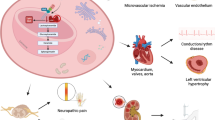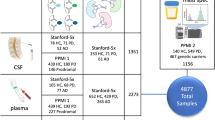Abstract
Lysosomal storage disorders (LSDs) comprise more than 50 extremely rare, inherited metabolic diseases resulting from a deficiency of specific lysosomal enzymes required for normal macromolecular metabolism. The National Collaborative Study for Lysosomal Storage Disorders (NCS-LSD), was a longitudinal cohort study which collected prospective and retrospective clinical data, and patient-reported data from adults and children with a confirmed diagnosis of Gaucher disease, Fabry disease, mucopolysaccharidosis type I (MPS I), mucopolysaccharidosis type II (MPS II), Pompe disease and Niemann Pick disease type C (NPC) in the UK. The study aimed to determine the natural history of these conditions and estimate the effectiveness and cost of therapies. Clinical outcomes were chosen to reflect disease progression. Age- and gender-adjusted treatment effects were estimated using generalised linear mixed models. Treated patients contributed data before and during treatment while untreated patients contributed natural history data. A total of 711 adults and children were recruited to this study from the seven LSD treatment centres in England. Data was collected from 2008 to 2011. This paper describes the methods used to collect and analyse clinical data for this study. The clinical findings are reported separately in a series of condition-specific articles in this issue.
Similar content being viewed by others
References
Beck M (2001) Variable clinical presentation in lysosomal storage disorders. J Inherit Metab Dis 24(Suppl 2):47–51, discussion 45-46
Chakrapani A (2010) Guidelines for the management of infantile Pompe disease. http://www.specialisedservices.nhs.uk/library/23/Guidelines_for_Infantile_Pompe_Disease.pdf. Accessed 5 Feb 2014
Deegan P (2012) Adult Gaucher disease standard operating procedures. http://www.specialisedservices.nhs.uk/library/23/SOP_for_adult_Gauchers_disease.pdf. Accessed 5 Feb 2014
Diggle PJ, Heagerty PJ, Liang K, Zeger SL (2002) Analysis of longitudinal data, 2nd edn. Oxford Statistical Science Series. Oxford University Press
Gelman A, Hill J (2007) Data analysis using regression and multilevel/hierarchical models. Cambridge University Press
Gieselmann V (2005) What can cell biology tell us about heterogeneity in lysosomal storage diseases? Acta Paediatr Suppl 94(447):80–86, discussion 79
Hughes F, Ramaswami U, Elliot P (2005) Guidelines for the diagnosis and management of Anderson-Fabry disease. http://webarchive.nationalarchives.gov.uk/20130107105354/http://www.dh.gov.uk/en/Publicationsandstatistics/Publications/PublicationsPolicyAndGuidance/DH_4118404. Accessed 5 Feb 2014
Little RJA, Rubin DB (2002) Statistical analysis with missing data, 2nd edn. Wiley, New York
Meikle PJ, Hopwood JJ, Clague AE, Carey WF (1999) Prevalence of lysosomal storage disorders. JAMA 281(3):249–254
Vellodi A, Wraith JE, Chakrapani A, Hendriksz C, Jones S, Lavery C (2010) Mucopolysaccharidosis type II: guidelines for assessment, monitoring and enzyme replacement therapy (ERT). http://www.specialisedservices.nhs.uk/library/23/Guidelines_for_Mucopolysaccharidosis_Type_II.pdf. Accessed 5 Feb 2014
Vellodi A, Wraith JE, Collin-Histed T, Chakrapani A (2012) Paediatric Gaucher disease in England: Guidelines for assessment, monitoring and enzyme replacement therapy. http://www.specialisedservices.nhs.uk/library/23/Guidelines_for_paediatric_Gauchers_Disease.pdf. Accessed 5 Feb 2014
Wood SN (2006) Generalized additive models: an introduction with R. Chapman & Hall/CRC, London
Wraith JE, Vellodi A, Cleary MA, Ramaswami U, Lavery C, Jessop E (2010) Guidelines for the investigation and management of Mucopolysaccharidosis type I. http://www.specialisedservices.nhs.uk/library/23/Guidelines_for_the_Investigation_and_Management_of_Mucopolysaccharidosis_type_I.pdf. Accessed 5 Feb 2014
Wyatt K, Henley W, Anderson L et al (2012) The effectiveness and cost-effectiveness of enzyme and substrate replacement therapies: a longitudinal cohort study of people with lysosomal storage disorders. Health Technol Assess 16(39):1–543
Acknowledgments
We thank study site personnel Marie Meehan, Andrea Hill, Debbie Hugh, Sarah West, Sandhya Maddukuri, Kate Blackler, Hannah Russon, Navneeta Reddy, Jennifer Hutchinson, Nike Aina and Noura Hamdi for their hard work in the recruitment of patients to this study, and in managing the patients’ data at each of the seven sites. We thank the late Ed Wraith, Stephen Waldek, Derralynn Hughes, Robin Lachmann, Atul Mehta, Patrick Deegan, Tim Cox, Chris Hendriksz, Philip Lee, Uma Ramaswami, Ashok Vellodi, Simon Jones and Tanya Collin-Histed for their contribution to the design and conduct of the study. Thanks to Sheena Oxer and Louise Klinger for their contribution to the set-up and coordination of the study, and to Laura Cocking for her help in the design and the management of the databases throughout the study.
We are grateful to all members of the Lysosomal Storage Disorders patient support groups for the advice and support and thank all members of the Trial Steering Committee for their advice along the way.
Special thanks to the patients and their families who allowed us to collect information from their hospital records and gave their time to complete the questionnaires. We thank them for their invaluable contribution.
Funding
This study was funded by a National Institute for Health Research Health Technology Assessment programme project grant (No: 05/04/01).
Conflict of interest
None.
Author information
Authors and Affiliations
Corresponding author
Additional information
Communicated by: Frits Wijburg
Rights and permissions
About this article
Cite this article
Henley, W.E., Anderson, L.J., Wyatt, K.M. et al. The NCS-LSD cohort study: a description of the methods and analyses used to assess the long-term effectiveness of enzyme replacement therapy and substrate reduction therapy in patients with lysosomal storage disorders. J Inherit Metab Dis 37, 939–944 (2014). https://doi.org/10.1007/s10545-014-9679-6
Received:
Revised:
Accepted:
Published:
Issue Date:
DOI: https://doi.org/10.1007/s10545-014-9679-6




